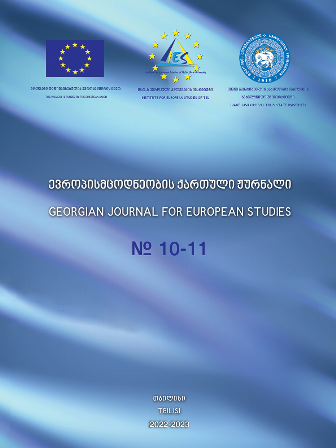STRATEGIZING THE INTEGRATION OF THE EFFECTIVE TRADITIONAL AND INNOVATIVE PEDAGOGIC METHODS AS PART OF THE PROCESS OF THE DEVELOPMENT OF THE JEAN MONNET UNDERGRADUATE PROGRAMME IN EUROPEAN STUDIES AT IVANE JAVAKHISHVILI TBILISI STATE UNIVERSITY
Keywords:
Undergraduate Programme in European Studies, Development of the Programme, Accreditation, Incorporation of the effective traditional and innovative Pedagogic Methods in the curriculumAbstract
This article reviews the context and some of the most important aspects of the process of the development of the new undergraduate programme in European Studies at the Institute for European Studies (IES) of Ivane Javakhishvili Tbilisi State University (TSU). The action was financed by the EU within the frames of Erasmus+ Jean Monnet project ‘EUStBA’. This support became a game-changer in terms of enabling the meaningful participation of the large circle of stakeholders during the different phases of project implementation. Once we had set in train the project of completing our efforts in the building of the European Studies education at all three cycles of education, the initiatives in this field rapidly came to be viewed within the framework of the institutional development and self-sustainability strategy. This action facilitated not only establishment and accreditation of the new undergraduate programme, but also synergized well with the upgrade of the TSU Institute for European Studies across the range of vast spectrum of issues, which ended up in the second mandatory reaccreditation of Master’s programme and successful finalization of the long negotiations on two double degree programmes.
The working package on the effective amalgamation of the traditional and innovative Teaching Methods was another important dimension across the various phases of the ‘EUStBA’ project implementation. This sub- action made sure that the content of the new undergraduate programme reaches its most important audience in an efficient manner. Hence, the second part of this article discusses the role of the ‘EUStBA’ project in mainstreaming the elaboration of a coherent and a purpose-driven strategy, which was aimed at incorporation effectively of traditional and innovative teaching methods in the Undergraduate and graduate programmes of IES. The activities aimed at teaching and learning the EU from the perspective of four different disciplines at Ivane Javakhishvili Tbilisi State University was indeed a challenging endeavor that paved the way for the successful outcome in the accreditation process of the newly developed Undergraduate programme in European Studies.


